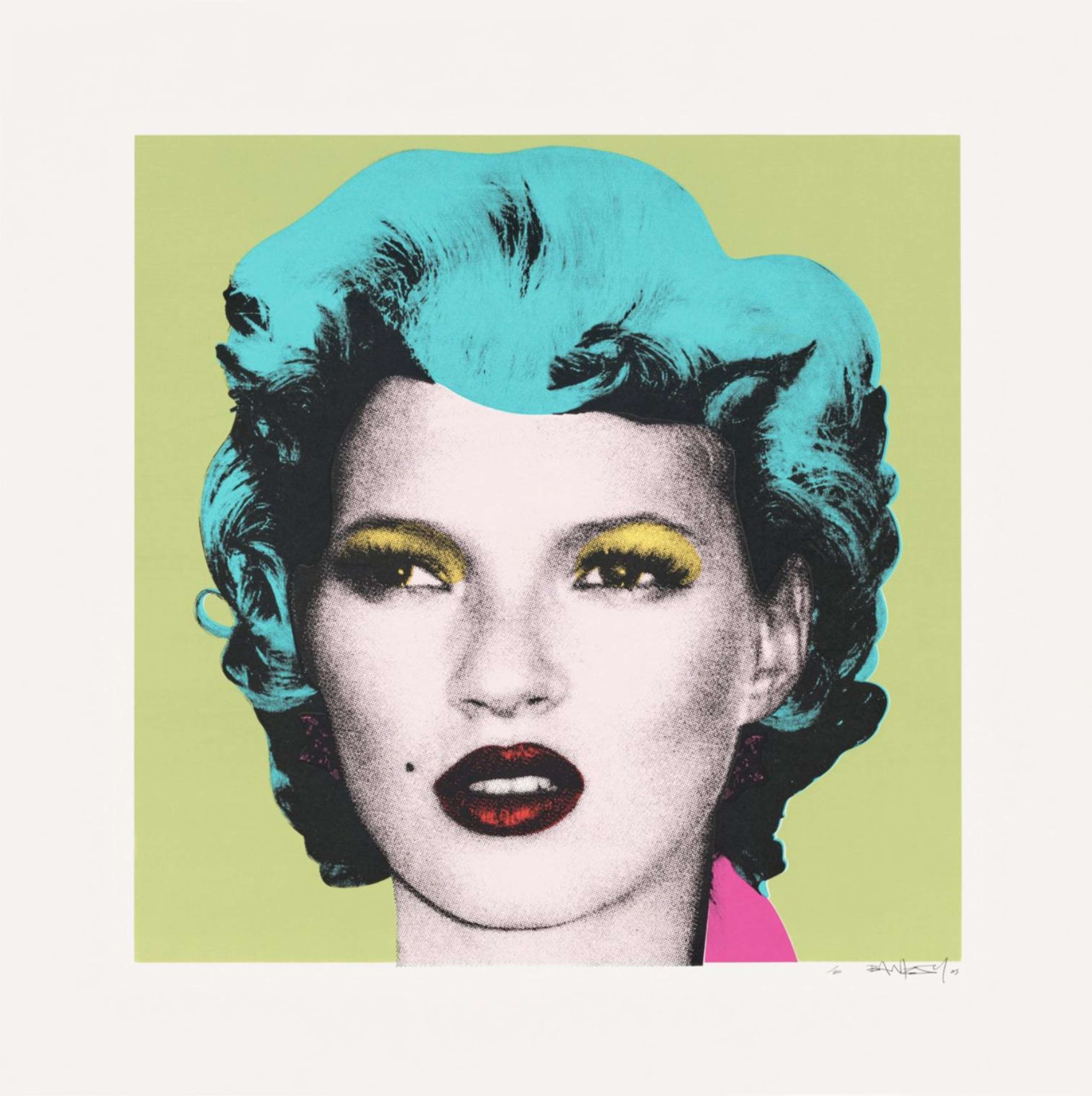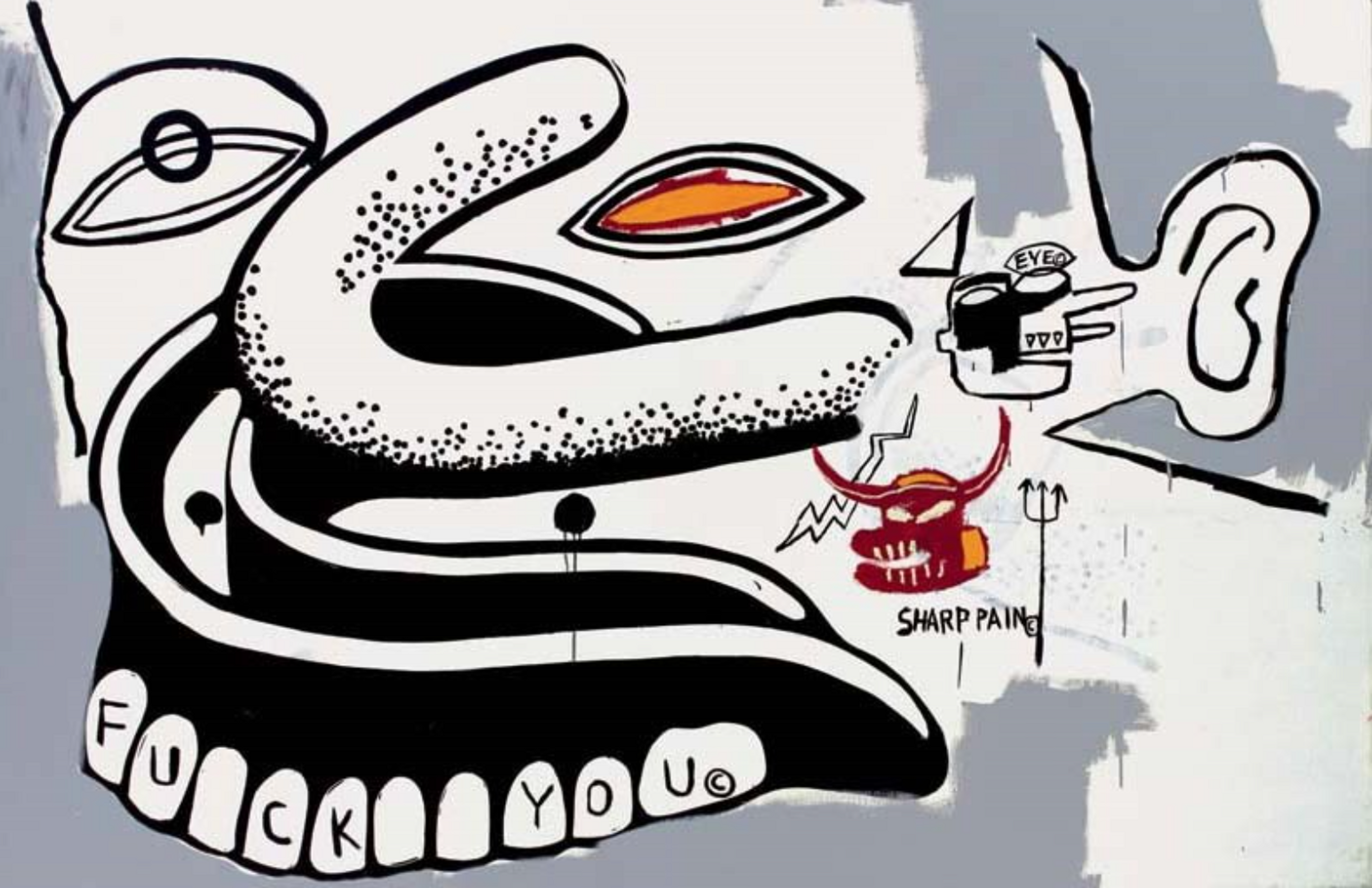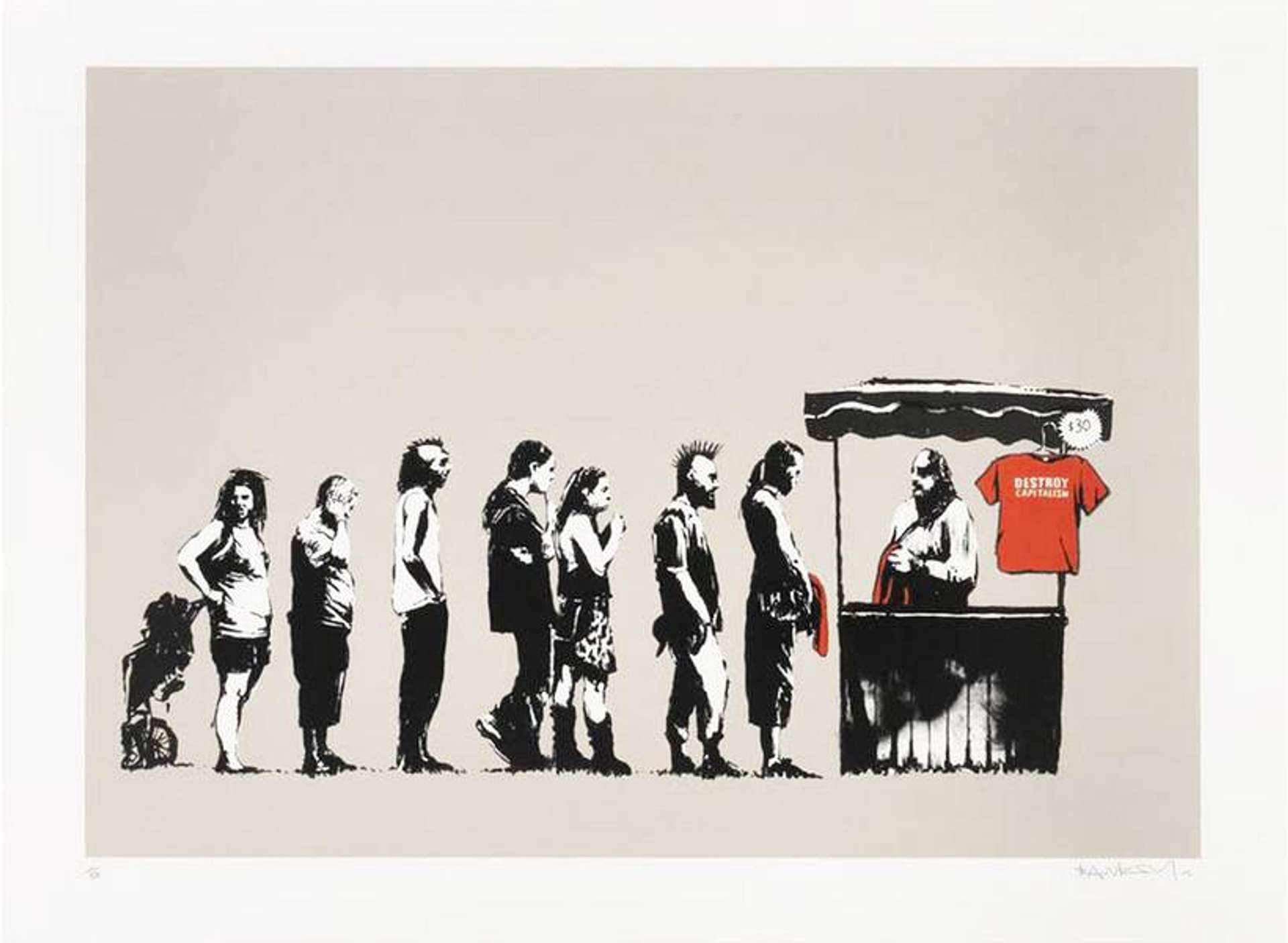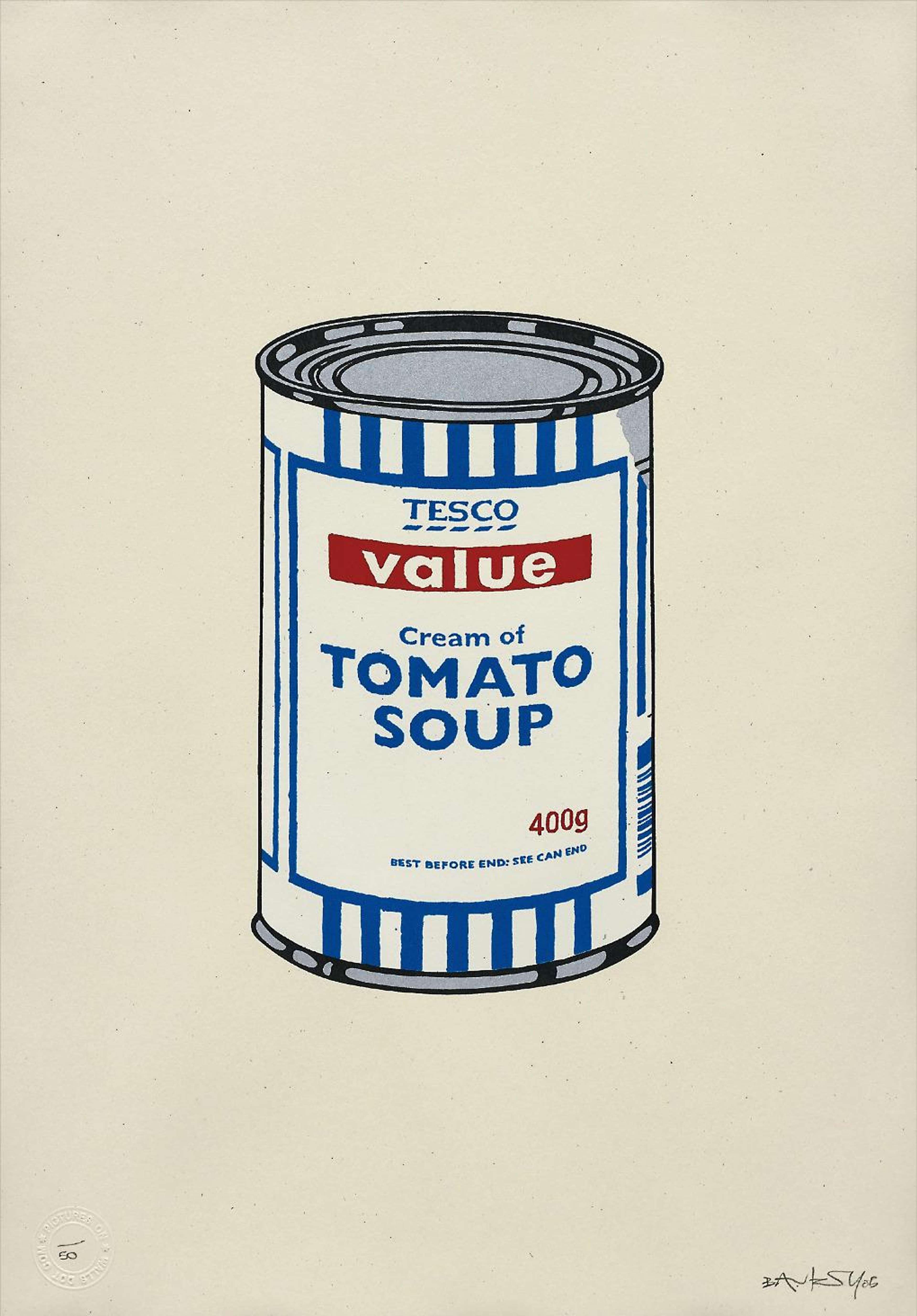Top Testaments to Andy Warhol by Urban & Contemporary Artists
 Kate Moss (Green) © Bansky 2005
Kate Moss (Green) © Bansky 2005
Interested in buying or selling
Andy Warhol?

Andy Warhol
493 works
Andy Warhol prints and paintings have had a profound influence on the work of many Contemporary artists. The likes of Keith Haring, Banksy, Jean-Michel Basquiat, and Damien Hirst have all referenced Andy Warhol and his unmatched legacy in their own work.
In this article, we look at the many references to Andy Warhol in contemporary art, including many that feature in the MyArtBroker Collection.
The New York Scene: Keith Haring & Andy Warhol
Inspired by the invention — and unstoppable rise — of Graffiti in New York City during the 1970s and 80s, Keith Haring began his artistic career as a street artist. He worked predominantly in the New York City subway, adorning its walls and advertising placards with dynamic, cartoon-like figures, and other symbols he called ‘Icons’. These were inspired by his time spent studying Semiotics at New York’s School of Visual Arts.
In the early 1980s, Haring met Andy Warhol — the godfather of America’s burgeoning Pop Art scene and owner of the New York studio (or series of studios) The Factory — an infamous art studio-come-nightclub in Manhattan.
The pair’s first meeting was brief. It was only after a show at the city’s Fun Gallery that the duo became closer. Even before Warhol's art had an impact on Haring's, the two shared similar histories. Warhol had worked as a commercial illustrator in New York before making his name in the art world; Haring had enrolled at a school in Pittsburgh, intending initially to also become a commercial illustrator, before realising the career was not for him.
Commenting on his relationship with Andy Warhol, Haring said: ‘Before I knew [Andy], he had been an image to me. He was totally unapproachable. I met him finally through Christopher Makos, who brought me to the Factory […]. It was difficult for him to be comfortable with people if he didn’t know them. Then he came to another exhibition at the Fun Gallery, which was soon after the show at Shafrazi. He was more friendly. We started talking, going out. We traded a lot of works at that time.’
Warhol’s impact on Haring was huge, pushing him to create more and more artworks.
In 1986, Haring issued an extremely limited edition of prints in 8 colours. Entitled the Andy Mouse series, these playful, graphic works see Haring combine two symbols of his most important influences: Walt Disney’s Mickey Mouse and Andy Warhol himself.
Andy Mouse 1 and Andy Mouse 2 play tribute to the hard-edged, graphic approach to composition that Andy Warhol pioneered with his silkscreen paintings and Xerox-based works.
In Andy Mouse 3, Haring’s Mickey/Warhol character is positioned at the centre of a US Dollar bill. His portrayal as an American icon on a par with Benjamin Franklin or Abraham Lincoln – two historical figures who feature on US currency – serves to highlight his importance in Haring’s eyes.
Following his diagnosis with HIV in 1987, and undeniably influenced by Warhol’s almost mechanical production process, Haring began to create much larger artworks, and at a rapid rate.
Painted between hospital visits and doctors’ appointments, his murals called for urgent scientific research into the virus – about which very little was known at the time – as well as the pressing need to protect yourself by practicing safe sex. One of his most famous, Todos Juntos Podemos Parar el SIDA (1989), was painted in Barcelona.
Banksy: Child of Warhol's Legacy
Although he was just 13 years-old when Andy Warhol died in 1987, British Street Art legend Banksy has referenced the King of Pop Art in his own work.
Whilst Banksy’s iconic Choose Your Weapon references one of Keith Haring’s so-called ‘Icons’, Banksy’s Soup Can series seizes upon Andy Warhol’s iconic Campbell’s Soup can prints, reappropriating them for a British audience.
As the story goes, Andy Warhol chose to make works featuring the Campbell’s soup tin because of its strong associations with capitalism, consumerism, and the American working class. In an interview, the artist even remarked that before he made his fortune, he had spent 20 years eating a tin of this very soup for lunch every day.
In his own version of these classic images, which also features in the Soup Cans (Quad) series, Banksy co-opts an icon of British consumer culture: the Tesco Value range.
Known for its no-frills design and instantly recognisable ‘blue lines’, the Value range was the mainstay of the cost-cutting consumer during the 1990s and early 2000s.
More generally, it could be argued that Banksy’s stencil-based designs – visible in standout works like Bomb Love and Love Is In The Air (Flower Thrower) are indebted to Warhol’s ‘blotted line’ technique, as well as his use of an overhead projector to create ‘traced’ works, such as Grace Kelly (F.& S. 11.305) (1984).
Jean-Michel Basquiat & Warhol's Collaborative Period
Famed for his anatomical drawings and vivid, dynamic portrayals of Black American life, american visual artist Jean-Michel Basquiat started out as a humble graffiti writer working on the streets of New York. Ascending to international recognition in the 1980s, Basquiat’s seemingly unstoppable rise was in part due to his friendship with Andy Warhol.
The pair first met when Basquiat spotted Warhol dining at the W.P.A. restaurant in Manhattan’s Spring Street with friend and curator, Henry Geldzahler.
In 1982, when Basquiat became the youngest ever artist to exhibit at documenta in the German city of Kassel – an art event that takes place every 5 years and a major influence on Gerhard Richter – he was granted a one-man show at the Zurich gallery of Bruno Bischofberger, who later became his art dealer.
Bischofberger arranged for Andy Warhol and Basquiat to have lunch, and the pair instantly became friends. By 1983, Basquiat’s home and studio was located in a Manhattan loft owned by Warhol, who had become his patron.
In 1984 and 1985, the pair completed several collaborations, including the paintings Taxi 45th/Broadway (1984-5), Amoco (1984), and Untitled (50 Dentures) (1984).
Read more about the pair's turbulent collaboration here.
 image © Christie's / Fuck You, Dentures © Andy Warhol & Jean-Michel Basquiat 1984
image © Christie's / Fuck You, Dentures © Andy Warhol & Jean-Michel Basquiat 1984Money, Money, Money: Damien Hirst Inspired by Andy Warhol
The once controversial Young British Artist (YBA) Damien Hirst has often been touted as the natural heir to Andy Warhol and his vast Pop Art empire.
Although perhaps he doesn’t quite succeed in fulfilling Warhol’s erstwhile role as the ‘bellwether of the art market’, Hirst has certainly been influenced by the Pittsburgh-born artist, both in terms of his artistic philosophy and striking visual style.
Commenting on Warhol’s continued importance within the contemporary art world, the influential and controversial artist remarked:
Attracting large sums when under the hammer at auction, Hirst’s ‘Spot’ paintings and prints are his most obvious reference to Andy Warhol.
Each named after a different drug, picked at random from a trade catalogue of biochemical and diagnostic reagents, these pieces’ titles include Methylthymidine (2008), Dequalinium Chloride (2016), and Phendimetrazine (2011). The reason for naming each work after a different drug was that it gave the series a seemingly endless scope – in theory, it could carry on forever.
Once they had begun to gain momentum, the Spot paintings were passed on to Hirst’s many assistants, who produced them in an almost mechanised fashion.
Following the lead of Andy Warhol, who himself used a large number of assistants to produce screen prints on a mass scale at his New York studio The Factory (in 1964 he was creating up to 80 prints a day), this was Hirst’s first forays into ‘art fabrication’.
Commenting on his use of assistants, Hirst once said: ‘… the best person who ever painted spots for me was Rachel [Howard]. She’s brilliant. Absolutely fucking brilliant. The best spot painting you can have by me is one painted by Rachel.’
The series Till Death Do Us Part (2011) also makes a thinly-veiled reference to Warhol’s Skulls from 1976 as well as his game-changing Marilyn Monroe and Mao paintings, produced during the ‘60s and ‘70s.
It is hardly surprising that Hirst, an artist interested in the relationship between art and money, should be make works after Andy Warhol's Marilyn Monroe paintings: in May 2022, one of these works, entitled Shot Sage Blue Marilyn (1964), sold for US$195 million (£158 million) at Christie’s New York, making it the most expensive piece of 20th-century art ever sold.
To learn more about the value of Warhol's print market today, read our 2023 American Pop Print Report here.
Invader: Rubikcubism 2023
In the most recent of tributes to the King of Pop Art, Andy Warhol, by contemporary artists, Invader collaborated with HENI Editions to produce four new limited edition prints from Invader's longrunning series of works composed of Rubik's cube, Rubikcubism. Of the four prints, which dropped between 2 February 2023 and 12 February 2023, one is titled Rubik Shot Red Marilyn. The print derives from Invader's earlier 'Rubik Master pieces': works that recreated famous paintings such as Leonardo da Vinci’s internationally-recognisable painting, the Mona Lisa, Roy Lichtenstein's Ohh Alright.
The prints are diasec-mounted giclée on aluminium composite panel, and are dominated by the bold red of both Warhol's original artwork, and of the Rubik's cube. While Warhol's Marilyn Monroes are innate icons of modern art—begun in 1962, they immortalize the Hollywood star and Warhol's lifelong obsession with the iconoclastic glamour and seedy intrigue of pop culture—the 'Shot' versions of the paintings are arguably even more so. Created in 1964, Andy Warhol painted five Marilyns, four of which were infamously shot by performance artist Dorothy Podber in Warhol's New York studio, The Factory, becoming the iconic "Shot Marilyns" works.
Arguably the most iconic of the four shot works is Shot Sage Blue Marilyn, given that the original made headlines in May 2022, when it sold for an astonishing US$195 million (£158 million) at Christie’s New York, becoming not only the most expensive Warhol ever, but also the most expensive piece of 20th-century art ever sold. Though Invader's Rubikcubism makes use of the 6 colours of the Rubik's cube tiles in a pointillist-inspired rendering, giving the artist the ability to create the illusion of intermediary hues and shades from a distance, it is no wonder that he opts to pay tribute to Warhol's Shot Red Marilyn, rather than its Shot Sage Blue counterpart; in addition to the difficulty of creating a sage shade with his restricted palette of white, yellow, red, blue, orange, and green, the bold, lipstick red of Marilyn's background is expressed perfectly by Invader. The contemporary street artist actually combines tiles from both the red and orange faces of the cube in order to replicate Warhol's shade best.
HENI made Invader's Rubik Shot Red Marilyn available for a period of 10 days, allowing demand for the work to dictate production and thus edition size. This approach to mass consumerism, though likely incidental, seems a fitting tribute to the King of Pop Art, whose proliferate production is well known.
 Image © HENI Editions 2023 / Rubik Shot Red Marilyn © Invader 2023
Image © HENI Editions 2023 / Rubik Shot Red Marilyn © Invader 2023Browse our original Andy Warhol prints for sale, or get a valuation here.







